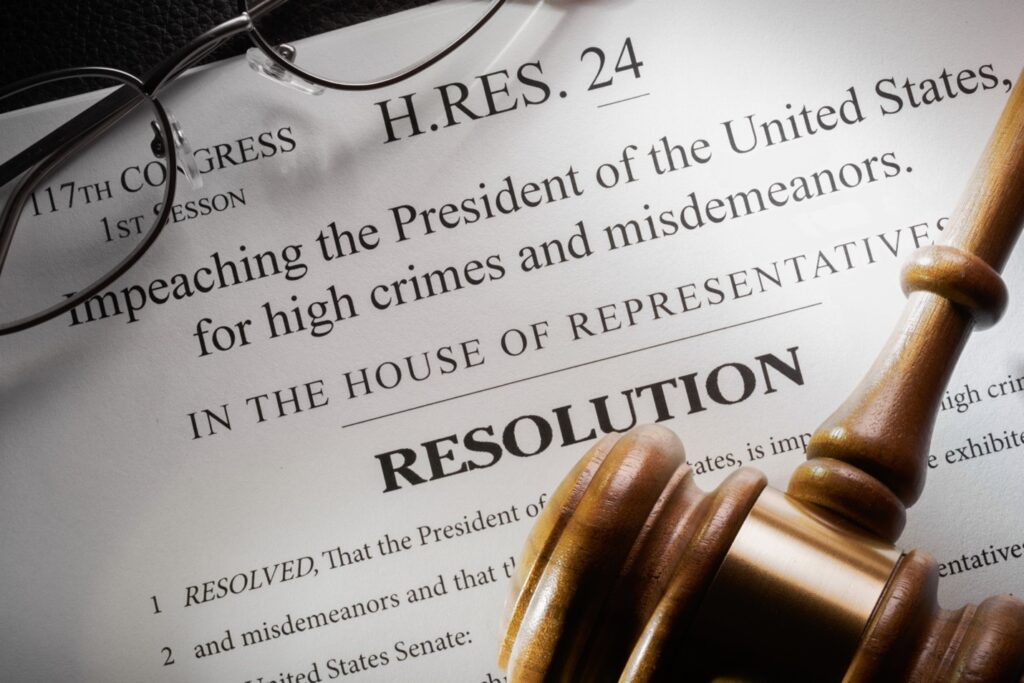
By Hunter Hines
Christian Action League
January 27, 2021
The second impeachment trial of former President Donald J. Trump will begin on February 8. But North Carolina’s two Senators, Tillis and Burr, have indicated they oppose it.
The Raleigh News and Observer noted that both Tillis and Burr voted to acquit Trump during his first impeachment last year. Both voted to certify the election results, recognizing Biden as the winner of the presidential election. And Tuesday, both voted for a motion that said that the former SCOTUS’s impeachment trial is “unconstitutional.”
The motion was introduced by Kentucky’s Republican Senator, Rand Paul, who argued Trump is now a private citizen, and an impeachment trial would only apply constitutionally to a sitting president.
Democrats, along with five Republicans, voted Paul’s motion down. However, 45 Republicans voted for the motion, showing the vast majority of Republicans don’t believe a trial should be taking place and there aren’t enough Republican votes to convict.
Bolstering this view is the unwillingness of the United States Supreme Court’s Chief Justice, John Roberts, to preside over a Senate trial. Instead, Sen. Patrick Leahy, Democratic Senate President Pro-Tempore from Vermont, announced that he would preside in Roberts’ absence.
On Monday, Burr told reporters that the President was a civilian now and that he believed any criminal charges should be referred to the Justice Department.
Tillis released a statement on Tuesday, which reads:
“On January 6, I said voting to reject the states’ electors was a dangerous precedent we should not set. Likewise, impeaching a former President who is now a private citizen would be equally unwise. The impeachment power can be turned into a political weapon, especially if it is primarily used to disqualify an individual citizen from running for public office. My Democratic colleagues would have rightfully objected to Republicans – when they controlled Congress – using the impeachment power to disqualify former Secretary of State Hillary Clinton from running for President in 2016 because of her email controversy. The great hallmark of our Democratic Republic is self-government, and I have faith in the American people to assess the qualifications of presidential candidates and make an informed decision themselves, just as they have done every four years since George Washington was elected as our first president. Congress should not dictate to the American people who they can and cannot vote for.”
The articles of impeachment against Trump sent over to the Senate from the House charge the former President with “inciting violence against the government of the United States” by making untrue statements about election fraud in an address to a crowd at the Ellipse in Washington, D.C. According to the articles, his remarks encouraged the lawless actions at the Capitol building on January 6, actions that were meant to interfere with Congress’s joint session to certify the election results in favor of his opponent, now President Joe Biden.
The charges also include the President’s phone call to Georgia’s secretary of state, Brad Raffensperger, which urged him to “find” enough votes to overturn the Georgia election results.

“In all this, President Trump gravely endangered the security of the United States and its institutions of Government. He threatened the integrity of the democratic system, interfered with the peaceful transition of power, and imperiled a co-equal branch of Government. He thereby betrayed his trust as President, to the manifest injury of the people of the United States,” says the document.
However, Mat Staver, head of Liberty Counsel, in recent correspondence to LC’s supporters, highlights a statement made by South Carolina Republican Senator Lindsey Graham, who said the trial was vindictive. Staver listed the following reasons a trial in the Senate would now be unconstitutional:
“The U.S. Constitution is unquestionably clear on the purpose and limits of the impeachment of a president:
“Article 2 Section 1 states: “The executive power shall be vested in a President of the United States of America. He shall hold his office during the term of four years…”
“Article 2 Section 4 states: “The President, Vice President and all civil officers of the United States, shall be removed from office on impeachment for, and conviction of, treason, bribery, or other high crimes and misdemeanors.”
“The keyword in each of these constitutional provisions is “office.”
“According to the plain language of the Constitution, impeachment may ONLY be used against a person currently in office.
“As of January 20, Donald J. Trump left the office of the President.
“If impeachment could be used against former officeholders, then every former officeholder could be impeached by the majority party. Indeed, the controlling party could impeach all future presidential candidates who were former officeholders.”
Rev. Mark Creech, executive director of the Christian Action League, said that he appreciated the position of North Carolina’s two Senators on impeachment.
“I think what happened on January 6 at the Capitol was more than unfortunate. It was exceedingly tragic,” said Creech. “Although I am not an attorney, I still think it would be most difficult to prove anything the President said was actually meant to stir the crowd at the Ellipse to storm the Capitol. What we need to think about is what precipitated all of this – anger. May I remind you that anger, figuratively speaking, is what dispenses the killer’s poison, lights the cannon’s fuse. That’s what our leaders need to be tamping down right now – anger. This trial, I believe, only stokes the fires of anger – something that promises to leave us barren and desolate as a country.”
